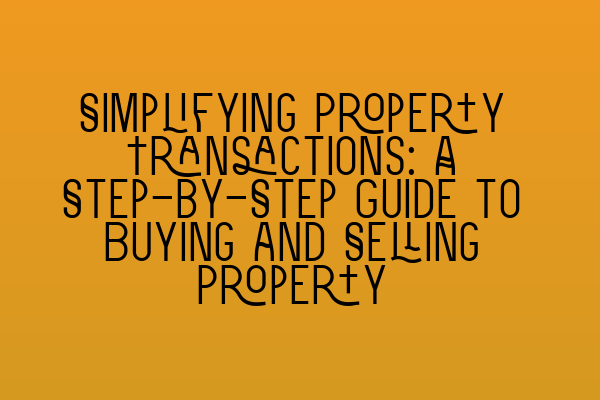Simplifying Property Transactions: A Step-by-Step Guide to Buying and Selling Property
Buying or selling property can be a complex and daunting process. From dealing with legal paperwork to navigating through various laws and regulations, it is important to have a clear understanding of the step-by-step process involved. In this comprehensive guide, we will simplify property transactions and provide you with a detailed overview of the key stages involved in buying and selling property.
Step 1: Research and Planning
Before venturing into the property market, it is essential to conduct thorough research and plan your strategy. Start by identifying your needs and preferences, such as the location, size, and budget. Research the local property market trends, property prices, and any upcoming developments that may affect your decision.
A link to our article on Updates in UK Property Laws: Key Changes and Implications can provide you with insights into recent legal developments that may impact property transactions.
Step 2: Engage a Solicitor
Having a solicitor or conveyancer on your side is crucial for a smooth property transaction. They will handle all the legal aspects involved, including conducting searches, preparing contracts, and ensuring compliance with regulations. Research and engage a reputable solicitor who specializes in property law.
If you are interested in understanding the legal challenges in property transactions, our article Legal challenges in property transactions: A comprehensive guide can provide you with valuable insights.
Step 3: Financing and Mortgage
Unless you are buying the property with cash, you will need to arrange financing. Research various mortgage options and engage with lenders to secure the most suitable mortgage deal. Your solicitor will liaise with the lender and handle all the necessary paperwork.
Step 4: Offer and Acceptance
Once you have found a property that meets your requirements, you will need to make an offer through your solicitor. The seller may accept the offer as it is or negotiate the terms. Your solicitor will ensure that the offer and acceptance are legally binding.
If you want to understand the essential guidelines for tenants and landlords when navigating lease laws in the UK, our article Navigating Lease Laws in the UK: Essential Guidelines for Tenants and Landlords can provide you with the necessary information.
Step 5: Conveyancing and Searches
The conveyancing process involves various legal checks and searches to ensure that the property is free from any legal issues or restrictions. Your solicitor will conduct searches like local authority searches, environmental searches, and title searches. These searches will reveal any potential concerns that need to be addressed before proceeding.
Step 6: Exchange of Contracts
Once all the necessary searches and checks have been completed, you will exchange contracts with the seller. At this stage, both parties are legally bound to proceed with the sale. You will need to pay a deposit, usually 10% of the property’s value, which is held in escrow until completion.
If you want to avoid common pitfalls related to property law questions, our article Dominate Property Law Questions: Avoiding Common Pitfalls can provide you with valuable insights.
Step 7: Completion and Moving In
The completion stage is when the property officially changes ownership. Your solicitor will arrange the payment of the remaining balance and facilitate the transfer of funds. Once completed, you will be given the keys to the property, and you can move in or take possession as agreed.
Step 8: Post-Completion Matters
After completion, your solicitor will handle post-completion matters, including registering the property with the Land Registry, paying stamp duty if applicable, and providing you with all necessary documentation related to the property.
If you are preparing for your property law exams, our article Land Law Revision Tips: Ace Your Exam Preparation can provide you with essential guidance on exam preparation.
By following this step-by-step guide, you can simplify the property transaction process and ensure a smooth and successful buying or selling experience. Remember, having a reputable solicitor by your side is essential to navigate through the legal complexities involved in property transactions.
If you have any further questions or need professional assistance, please reach out to us at SQE Property Law & Land Law. We are here to help you throughout your property transaction journey.
